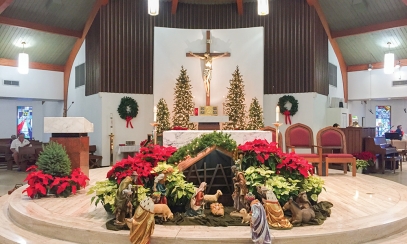
I Never Really Learned How to Make a Good Confession. Any Suggestions?
February 28, 2023
February 28, 2023
QUESTION: I went to Catholic grade school and received my sacraments. I wandered away in high school and college, not going to church for years. This Lent, I want to come back to church. I know I am supposed to confess before receiving Communion, but I am afraid. I never really learned how to make a good confession. Any suggestions?
ANSWER: Lent is a beautiful time to return to church and practice your faith. You will not be alone because, in Lent, every Catholic is called to renew their faith, break sinful habits, and embrace the Gospel with greater zeal. We are all sinners who seek the merciful love of our Heavenly Father and a share in Christ’s victory over sin.
Pope Francis recently altered the wording of the priest’s formula for absolution to emphasize God’s outpouring of the Holy Spirit for the forgiveness of sins. The new phrase reminds us that Confession is connected to Baptism, when God pours out His Spirit upon us, washing away our sins and welcoming us to his holy people. Therefore, making a good Confession begins with viewing confession and receiving absolution as God’s outpouring of the Holy Spirit to bring us His healing grace. God is a saving God who labors to redeem all his people. In Confession, the Holy Spirit works through the priest to return a sinner to the freedom and abundant life prepared for all God’s children.
Prayerful preparation for a sacramental Confession helps one experience the humbling act of naming one’s sins, not as a shameful burden but as redeeming grace. Preparation for the sacrament should begin several days before going to Confession. It begins with prayerfully expressing gratitude to God for his blessings and the salvation Christ won for us. A spirit of gratitude fosters a more fruitful examination of conscience, in which we turn away from sin and embrace life in Christ anew.
In examining our conscience, we pray for the Holy Spirit to guide us to the areas of grave sin we must confess. With the Spirit’s assistance, we notice the acts threatening our relationship with God, our communion with the Church, and our love for our neighbor. Sins flow from human nature’s wounds and weakness, where the evil spirit agitates and tempts to sin. Recognizing the dynamic of sin allows one to notice sinful thoughts, words, and actions. We should ask for the Holy Spirit’s gift of courage to admit we failed to do good and freely chose to do wrong. We should not succumb to the temptation to hide behind excuses or rationalizations. Instead, we should bravely and honestly name our sins.
A good examination of conscience makes it easier to state our sins in the Sacrament of Reconciliation. We should strive to state plainly the kind and number of our sins. One can identify sins by referring to the commandment violated or the deadly sin they constitute. We do not need to give details, but it is helpful to share factors that affect the gravity of the sin. When we grow comfortable articulating our sins in simple terms, making a good and complete confession will be easier. If one finds a particular sin harder to confess, one should confess it first to avoid the temptation to omit it out of embarrassment. Penitents often worry about figuring out the number of their sins. However, one should appreciate that naming the number helps bring the sin into the full light of God’s grace and promotes more profound healing. If necessary, give the number in general terms, for example, weekly, several times a month, or habitually. Knowing the number of sins occurring, even in general terms, helps the priest choose an apt penance.
The day before making a Confession, pray for true contrition for the sins you are to confess, genuine sorrow for the sin’s harmful effects, and regret for offending God. Prayerful reflection on the Act of Contrition or the Confiteor from Mass can inspire true repentance. Imagine speaking your sins to Christ on the Cross as preparation for confessing them in the Sacrament. The fruit of this type of prayer is the grace of genuine sorrow for one’s sins and greater ease in confessing them.
Before going to Confession, especially after many years away, it is good to familiarize oneself with the formula for confessing. The website https://hallow.com (and its app) helps one to learn the formula and has other prayers and guides for making a good confession.
Pope Francis also changed the absolution formula to say, “May God grant you His pardon and peace.” This change reminds penitents that God’s forgiveness is pure grace. It is freely given, not earned. One should rejoice in God’s gifts of pardon and peace with a grateful heart.
As you prepare for Confession, remember the Church on earth and in heaven is praying for you. Be not afraid!
Father Joe Waters is Judicial Vicar and Censor Librorum of the Diocese of St. Petersburg.
If you have a question you would like us to consider for this series, email communicate@dosp.org.



